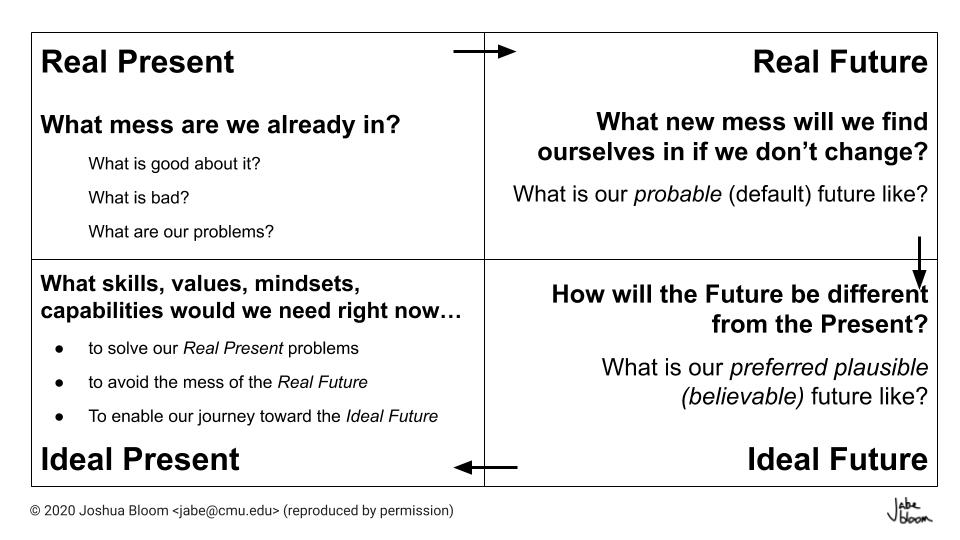I read a self-help book about performing well under pressure. The following is a blunt reinterpretation of the material to record what I think might be helpful in the present moment. I alone am the intended audience.
Work less, if you can. But if you can’t…
The Heuristics
A heuristic is a cognitive shortcut for decision-making. It is not guaranteed to be rational or even correct. It serves only to help you get to “good enough” in the short term.
Here are ten to try in bad times:
- “The challenge is __________. That’s what I’m here to do.”
- “__________ isn’t my only chance. There will be more in the future.”
- “I don’t actually have to __________. It’s really all optional.”
- “The original mission was __________. That’s my focus.”
- “Things that can go wrong: __________. My plan for each: __________.”
- “Even if it all goes wrong, I can live up to my values by __________.”
- “I’ve done work I’m proud of before, including __________.”
- “Things that can go right: __________. My plan for each: __________.”
- “Only __________ matters in the present moment. I will focus on that.”
- “The only things I can control in this situation are __________.”
Heuristic 1: Reframe as a challenge.
“Positivity is bullshit, but I will feel better if I act as if the task at hand is a challenge. So, fine. The challenge is __________.”
Heuristic 2: Not the last chance.
“No matter what it is that I’m working on, this probably isn’t the only chance I’ll get to do something like it. There will be more chances for me to succeed. It may not be this chance, but there will be more.”
Heuristic 3: Everything is optional.
“Nobody can make me do anything. There might be consequences, of course, but other people’s priorities are theirs, not mine. The importance of any particular task to me is then only a function of how important I decide it is.”
Heuristic 4: Focus on the mission.
“Worrying about the outcome won’t help. The mission I am here to do is __________. I can only do the best I can with what I have towards that intent.”
Heuristic 5: Rehearse the bad.
“I can’t know everything up-front, but I can take some decent guesses about ways this can go wrong or get worse. I can list these ways out and rehearse in my mind what I’ll do for each one.”
Heuristic 6: I am not the outcome.
“My identity is not defined by whatever ends up happening. My values are __________, __________, and __________. Even if everything goes wrong, I can still choose to live up to them.”
Heuristic 7: Review past success.
“I forget that I’m capable, that I’ve done things I’m proud of, and that I do have expertise. To remember, I can review the evidence of my past work.”
Heuristic 8: Rehearse the good.
“Things could go well, in a couple ways. I can rehearse in my mind what I’ll do in each case, so I stay aware of the upside and ready for opportunities.”
Heuristic 9: Deal with now.
“The situation is already in motion, and I am in it. All that matters is what I can do right now to make it better or make it worse. The present moment demands I care only about __________.”
Heuristic 10: Control what you can.
“There are so many things I cannot control, but there are a surprising number of things that I can. I can and will exert complete control over __________, __________, and __________.”
Final Thoughts
These heuristics are largely based on the book Performing Under Pressure: The Science of Doing Your Best When It Matters Most (affiliate link). I won’t go as far as to say that it’s a good book, but I do appear to have gotten something out of it.
A few other influences were present for me as I wrote this post.
Jabe Bloom taught me about present thinking and “the event” concept. I am grateful to him for helping me play with both of these ideas:


John Cutler taught me to use the fill-in-the-blank structure for thinking about the very real conversations we have with others and with ourselves. Structuring ideas in terms of conversations brings us closer to actually acting in those ways. It’s completely changed the way I think, and for that I’m also grateful.
Finally, a critical concept present to me while writing this post is conditions-consequences thinking, from Derek M.C. Yuen’s Deciphering Sun Tzu: How to Read the Art of War (affiliate link). My good friend Tasshin has written about it in.